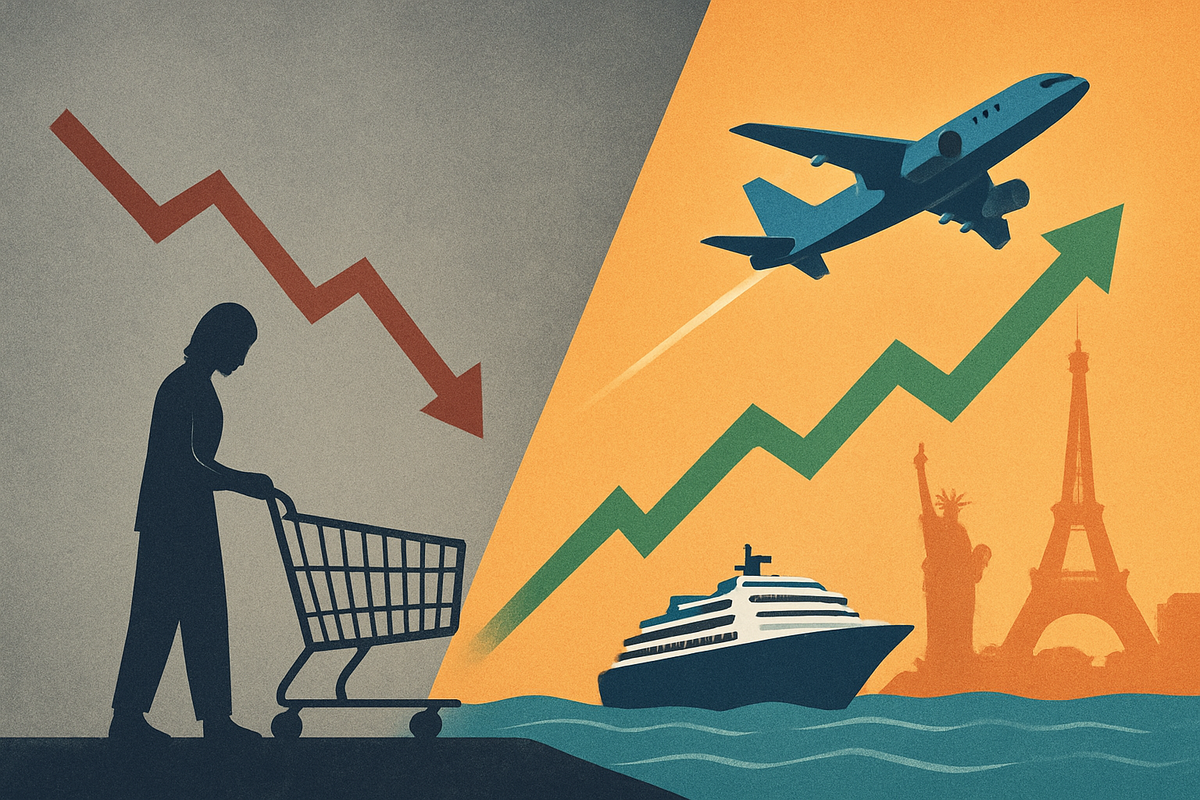
New York, NY – November 7, 2025 – The Consumer Discretionary Sector within the S&P 500 is currently presenting a complex and often contradictory picture for investors. While an undeniable chill permeates consumer sentiment, threatening to dampen holiday spending and broader retail activity, a vibrant travel industry continues to defy the gloom, emerging as a significant pocket of strength. This dichotomy highlights the sector's sensitivity to economic currents, forcing a nuanced view of its performance as the year draws to a close.
The sector's recent movements reflect this underlying tension. While the Consumer Discretionary Select Sector SPDR Fund (XLY) has seen a recent downturn, slipping 2.3% on November 6 and dropping 1.4% in the last month—nearly double the broader S&P 500's decline—its year-to-date performance still registers a positive 4.3%. This mixed bag suggests that while macro headwinds are strong, specific sub-sectors and individual companies are demonstrating remarkable resilience and even growth, painting a picture far from uniform decline.
Consumer Confidence Wanes, Retailers Brace for Impact
The primary driver behind the sector's recent struggles is a pronounced deterioration in consumer sentiment. The preliminary Michigan Consumer Sentiment index for the USA declined to 50.3 from 53.6 as of November 7, 2025, falling short of analyst expectations and signaling a weaker consumer outlook. This aligns with the US Economic Optimism Index for November 2025, which dipped to 43.9, marking the third consecutive month below the 50-point benchmark—a level of pessimism not observed since June 2024. This pervasive lack of confidence is widely anticipated to translate into reduced discretionary spending, particularly as the crucial holiday shopping season approaches.
The timeline of this declining optimism stretches back to November 2024, with persistent inflation and rising prices consistently cited as primary concerns for households. These economic pressures have led many consumers to plan a significant scaling back of non-essential purchases for the 2025 holiday season, prioritizing essentials and initiating their shopping earlier to manage budgets. Consequently, holiday sales outlooks for Q4 2025 generally forecast slower retail growth and weaker consumer spending compared to 2024. A PwC survey, for instance, projected a 5% year-over-year decline in average seasonal spending, marking the first significant drop since 2020, including an 11% drop in gift spending and a substantial 23% drop in holiday spending for Generation Z. S&P Global Ratings also anticipates holiday sales growth of only 4% in 2025, driven primarily by price increases due to tariffs rather than increased unit volumes, further reflecting the fragility of consumer confidence.
Despite the broad concerns, the sector's underlying profitability remains robust, with a strong operating margin of 14.37% and a net margin of 11.05%. Its beta of 1.35 indicates higher volatility compared to the broader market, a characteristic that amplifies both gains and losses in response to economic shifts. The Consumer Discretionary sector has also been a significant contributor to the S&P 500's earnings growth, ranking as the third-largest contributor to the increase in earnings since September 30, largely due to positive earnings surprises from companies like Amazon.com (NASDAQ: AMZN) and General Motors (NYSE: GM), which saw its blended earnings growth rate for the sector increase from -2.3% to 8.0% during this period.
Travel Soars While Retailers Face Headwinds
The current economic landscape creates a clear divide within the Consumer Discretionary Sector, with some segments thriving while others face considerable pressure. The travel industry, in particular, stands out as a beacon of strength. Propelled by a post-pandemic reprioritization of experiences over goods, the increasing prevalence of remote work enabling longer trips, and an improved financial outlook among certain demographics, travel demand is projected to remain robust throughout 2025. U.S. travel spending is forecasted to grow 3.9% to $1.35 trillion, with global travel spending potentially increasing by as much as 9%.
This robust demand is translating directly into strong corporate performance. Expedia Group (NASDAQ: EXPE) saw its stock surge nearly 18% on November 7, 2025, following a strong Q3 2025 earnings report that exceeded analyst expectations, signaling optimism for the broader global travel industry. Similarly, Booking Holdings (NASDAQ: BKNG) reported impressive Q2 2025 results, with a 13% year-over-year increase in gross bookings and a 16% rise in revenue, attributed to strong travel demand and strategic investments in AI tools. Cruise lines are also experiencing a resurgence, with Royal Caribbean Cruises (NYSE: RCL) emerging as a top-performing S&P 500 stock, boasting a 57.4% gain in 2025 as of late August. Even Disney's (NYSE: DIS) theme parks, cruise lines, and resorts reported a healthy 13% increase in operating income and an 8% rise in revenue in Q3 2025, underscoring the broad strength across the travel and leisure sub-sector.
Conversely, companies heavily reliant on non-essential consumer purchases are likely to bear the brunt of sinking consumer sentiment. General retailers, apparel brands, and certain home goods companies may face reduced sales volumes and increased promotional activity as consumers tighten their belts. However, even within this challenging environment, some individual consumer discretionary stocks have shown remarkable one-year returns as of November 5, 2025, indicating that selective strength can still be found. These include Tapestry Inc. (NYSE: TPR) with 127.61%, Tesla Inc. (NASDAQ: TSLA) with 80.83%, Ralph Lauren Corp. (NYSE: RL) with 56.83%, DoorDash Inc. (NASDAQ: DASH) with 54.50%, and Williams-Sonoma Inc. (NYSE: WSM) with 46.75%. This suggests that companies with strong brand loyalty, innovative offerings, or unique market positions can still outperform despite broader sector headwinds.
Broader Implications and Historical Parallels
The current state of the Consumer Discretionary Sector offers crucial insights into broader economic trends. The divergence between resilient experience-based spending and cautious goods-based spending highlights a significant shift in consumer priorities, likely amplified by the lingering effects of the pandemic and persistent inflationary pressures. This phenomenon fits into a wider trend of consumers valuing experiences and services more highly, a trend that began accelerating post-COVID-19 lockdowns. The sustained strength of the travel industry, despite broader economic concerns, underscores this fundamental shift.
The ripple effects of this cautious consumer environment extend beyond direct competitors. Suppliers to retail chains, logistics companies handling goods, and even advertising platforms catering to discretionary brands may feel the pinch. Conversely, businesses supporting the travel ecosystem—from airlines and hotels to local tour operators and restaurant suppliers in tourist destinations—are likely to continue benefiting. Regulatory or policy implications, such as the impact of tariffs on goods, are also playing a role, with S&P Global Ratings noting that expected holiday sales growth in 2025 is primarily driven by price increases due to these tariffs rather than increased unit volumes. Historically, periods of sustained low consumer confidence, such as those seen during the 2008 financial crisis or even the early stages of the COVID-19 pandemic, have consistently led to significant contractions in discretionary spending. The projected 5% year-over-year decline in average seasonal spending for 2025, the first significant drop since 2020, serves as a stark reminder of these historical precedents.
Navigating the Road Ahead
Looking ahead, the Consumer Discretionary Sector faces a period of continued recalibration. In the short term, retailers will be keenly focused on navigating a challenging holiday season, likely employing aggressive promotional strategies and optimizing inventory to align with tempered consumer demand. Companies in the travel and leisure segment, conversely, are poised for continued growth, though they will need to monitor for potential saturation or shifts in travel preferences. The long-term possibilities suggest a more permanent rebalancing of consumer spending habits, with experiences potentially holding a more prominent share of the discretionary wallet.
Strategic pivots will be essential for success. Retailers may need to adapt by focusing on value, enhancing their e-commerce capabilities, or diversifying into more essential goods or services. Travel companies, while currently enjoying tailwinds, will need to innovate to sustain growth, perhaps by offering unique packages, leveraging AI for personalized experiences, or exploring new niche markets. Market opportunities may emerge for companies that can effectively cater to the discerning, value-conscious consumer, or those that can offer truly unique and compelling experiences. Challenges will persist for businesses with high fixed costs and low brand differentiation in the goods sector. Potential scenarios range from a continued two-speed economy within the sector—travel thriving while goods struggle—to a broader economic improvement that could lift all boats, though the latter appears less likely in the immediate future given current sentiment indicators.
A Sector in Transition
In summary, the Consumer Discretionary Sector is at a critical juncture, defined by a stark contrast between a weakening consumer outlook and a flourishing travel industry. Key takeaways include the significant impact of declining consumer sentiment on retail, the robust and sustained demand for travel and experiences, and the necessity for companies to adapt their strategies to these divergent trends. The market moving forward will likely reward agility, innovation, and a deep understanding of evolving consumer preferences.
Investors should closely watch for further shifts in consumer sentiment data, the performance of key retail indicators during the holiday season, and any changes in travel booking trends. The sector's inherent volatility means that while headwinds are present, opportunities for growth in specific sub-segments remain compelling. The lasting impact of this period will likely be a more refined and diversified Consumer Discretionary Sector, where adaptability and strategic positioning determine ultimate success.
This content is intended for informational purposes only and is not financial advice




